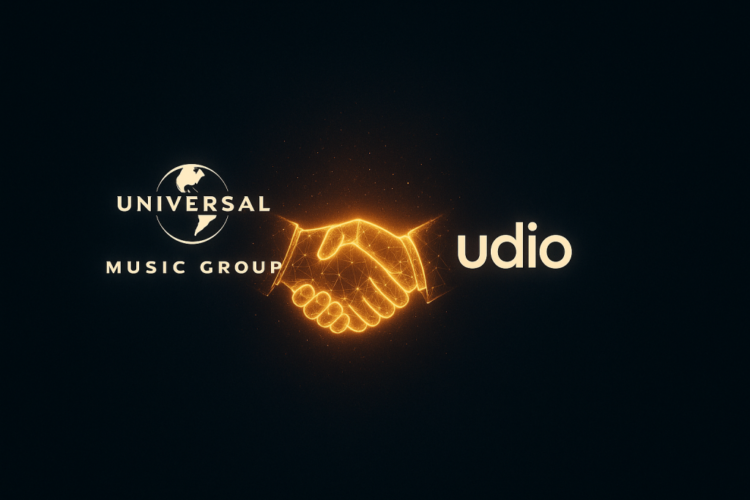As the paint dries on a groundbreaking deal between Universal Music Group and Udio owner Uncharted Labs, here’s a rundown of all the terms revealed so far — officially or otherwise.
For starters, this deal terminates a contentious legal battle between between UMG and Udio parent Uncharted Labs, one that — up until a few hours ago — looked like a full-blown war zone. Now that a deal is in place and the copyright infringement charges dropped, UMG is effectively setting a strong precedent — and more importantly, a template — for future deals involving generative AI music platforms and music companies and IP owners.
Another critical detail is that Udio has agreed to what UMG called a ‘compensatory legal settlement,’ with licensing agreements covering both recorded music and publishing assets. That effectively reverses the revenue-draining threat of AI by creating a revenue-generated pipeline for UMG-inked artists.
Among the big deal makers here: Udio Cofounder/CEO Andrew Sanchez, UMG chairman and CEO Sir Lucian Grainge, and UMG EVP and chief digital officer Michael Nash — among others.
Here’s a closer look at all of the emerging details on this tie-up, confirmed by the parties late Wednesday (October 29th).
In terms of the deal itself: Universal Music Group is dropping its litigation, and major labels Sony Music Entertainment and Warner Music Group are expected to follow suit — probably along similar lines.
UMG typically takes the lead on deals of this magnitude, but there’s no guarantee that the other majors — or indie coalition Merlin — will automatically follow suit or agree to cut n’ paste terms. Also, expect more AI deals ahead from UMG: Udio follows a number of other AI-related pacts spanning YouTube, TikTok, Meta, KDDI, KLAY Vision, BandLab, Soundlabs and Pro-Rata, among others.
Also unclear at this stage is whether certain artists or songwriters will opt-out of any deal, including larger artists. That was certainly a big problem during the early days of streaming, so stay tuned on this one.
There’s also no word yet from AI music startup Suno, which is also locked in litigation with UMG. While UMG brass are understood to be hammering out a broad number of deals, Suno’s name hasn’t been mentioned. That means Suno’s legal battle with UMG and other major rights owners remains active.
Additionally, it appears that litigation against Udio by various other label groups remains active. There’s also a group of artists suing Udio (and Suno), though a trickle-down deal is certainly possible in these cases.
In terms of the revamped Udio platform itself: Udio has now agreed to launch a completely new platform that will be trained on licensed songs only, with opt-in artist participation for all works.
Launch Timeline: A revamped Udio offering will be launched sometime in 2026, though a firm date has not been disclosed.
Platform Structure: Udio’s new platform will be a subscription service for music fans, creators, and artists, though aspects like pricing and tiers remain undetermined (or simply undisclosed). Once inside, fans will be able to create music based on licensed songs, including remixes and customized tracks. There’s now huge upside for fans deepening engagement with artists, DJs, producers and other UMG-inked creators.
Also important: the newly-revamped Udio will be a fully-licensed and protected walled garden environment. At this stage, it’s unclear what limitations will exist on sharing or collaboration, but restrictions will apply. That said, UMG is aiming to plug Udio’s new platform into social networks, though lots of details remain forthcoming here.
Training Data: The underlying AI technology used by Udio will be trained exclusively on authorized and licensed music (including both recorded music and publishing assets), on an opt-in basis. UMG artists and songwriters are expected to be given a choice to opt-in or opt-out of the Udio platform.
So what happens if you opt out? That hasn’t been spelled out.
How will artists be compensated exactly?
UMG artists and songwriters who opt in will be compensated in two ways:
(1) for their music used to train the AI model, and;
(2) when their songs are used by subscribers to create new works.
For those opting out, there’s no money — though some high-profile opt-outs could emerge (let’s see).
What happens before 2026?
During the transition period, Udio’s existing product will remain available, though it will be controlled within a walled garden protected by fingerprinting, filtering, and other measures before the new licensed service launches. That sounds like a lot of work, especially with 2026 right around the corner.
We’ll spill more when we know more! Stay tuned.







